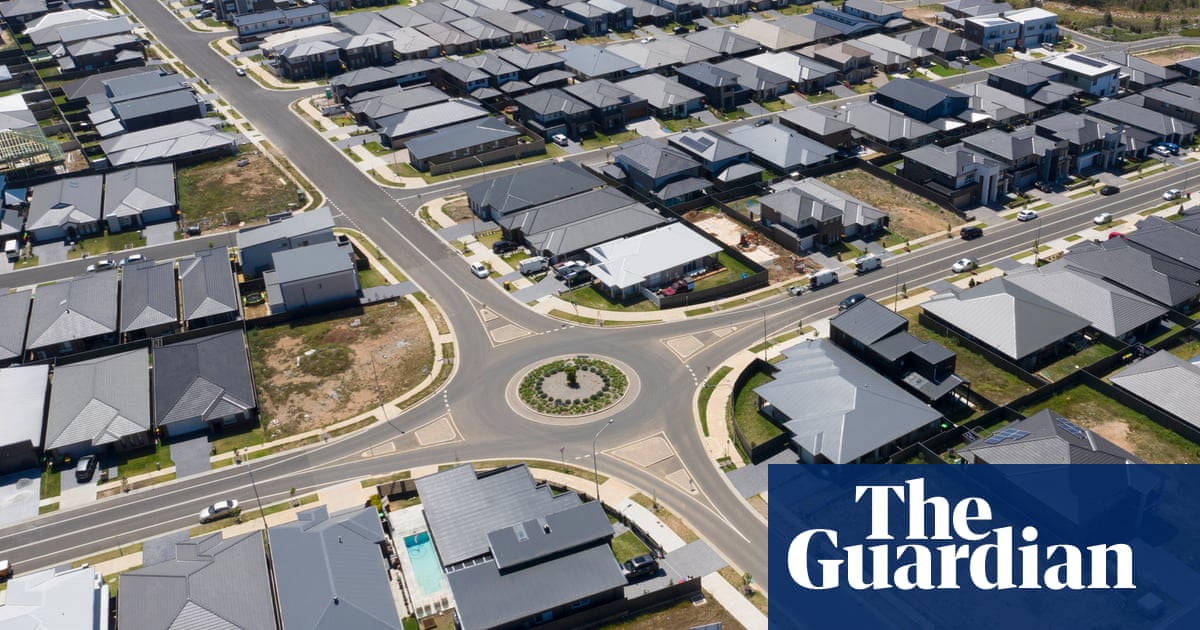Developers in New South Wales will be able to choose between paying a levy of $12,000 per lot, or building infrastructure such as roads and parks themselves as an “in kind payment” payment in a further push to speed up theconstruction of new housingin the state.
The changes will be revealed today by the premier,Chris Minns, ahead of next week’s state budget.
It will probably be welcomed by groups like the Property Council of NSW which has long complained that the $12,000 levy adds to developers’ financing costs and puts them at the mercy of government agencies to provide infrastructure like roads, parks and schools.
However, past experiments with developer-constructed infrastructure has resulted in serious problems. A housing development at Wilton on Sydney’s fringe was without sewer services when homeowners began moving in, leaving residents reliant on having sewerage trucked away.
Sign up for Guardian Australia’s breaking news email
“You can’t build new homes without roads, parks, and schools to match, and the community shouldn’t have to wait for them,” Minns said of the new arrangements.
“Whether it’s new tax incentives, planning reforms or fast-tracking infrastructure, we’re focused on making it faster and easier to build the homes and communities NSW needs.”
The treasurer, Daniel Mookhey, said the government’s focus was improving efficiency of investment, and that meant making government investment more effective as well as making private sector investment easier.
“Household income is beginning to be rebuilt, but we do have a challenge of making sure that the economy is growing so living standards are growing … and that we are delivering for people the quality of life that they expect,” he said.
“And so that’s what’s been sitting behind, thinking around the strategy of this budget, that we have to fix the essentials that people rely upon and set the state up for growth.”
A focus of the budget is likely to be further streamlining investment in planning.
The budget will probably allocate funds to overhaul NSW’s planning laws after a round table in February and an offer by the opposition to work on planning reform.
The government has already announced changes to zoning around transport nodes to encourage low and medium density development. Thetransport oriented development programis designed to build 112,000 new homes within 800 metres of transport within five years.
Mookhey will also announce changes to tax concessions for build-to-rent developments, which are designed to promote investment in developments that offer long-term, stable rental options and in some cases, housing for key workers.
Sign up toBreaking News Australia
Get the most important news as it breaks
after newsletter promotion
BTR projects have been slow to gain acceptance among developers in NSW despite a 50% land tax discount, introduced by the previous government. Labor will announce the discount will be extended indefinitely.
Victoria leads the way with 11,098 BTR units either completed or under construction, and another 14,440 in the pipeline – totalling 25,538.
NSW has 3,584 completed or under construction and 11,505 in the pipeline, with the total number of BTR units totalling 15,089.
Build-to-rent developments typically provide returns to investors through long-term and stable rental income.
This means that build-to-rent housing may offer longer-term lease options, better security for tenants, and more housing choice for people at different life stages.The expiry of the tax concession in 2039 is a key factor affecting investment decisions today, Mookhey said.
The budget, which will be handed down on Tuesday 24 June, will reveal the pressures that natural disasters have put on the state’s finances, as well as the increased claims for psychological injuries, particularly by the state’s workers.
